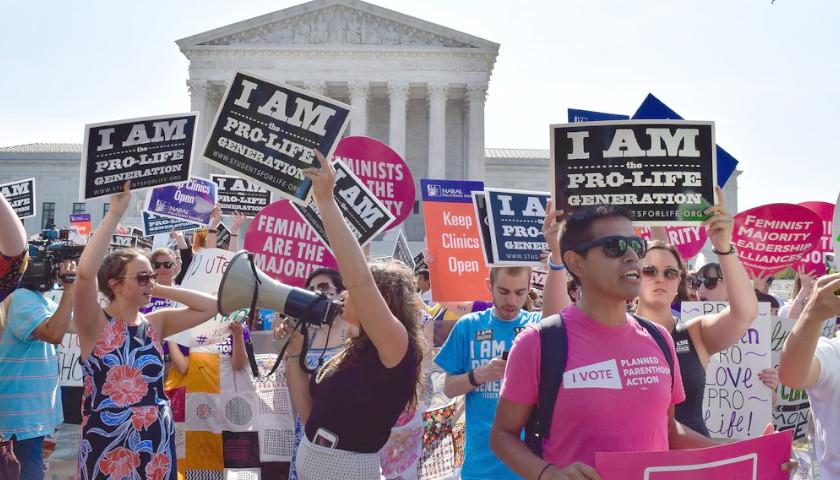by Keith Rothfus
While President Joe Biden’s halting performance in the first 2024 presidential debate generated the most significant commentary, it was some of former President Donald Trump’s remarks that raised concerns for pro-life voters. Those remarks ended up foreshadowing the recently proposed Republican platform’s surrender on the abortion issue.
Trump’s first misstep was his contention that “everybody” wanted abortion regulated at the state level. “Fifty-one years ago you had Roe v. Wade,” Trump argued, “and everybody wanted to get it back to the states, everybody, without exception, Democrats, Republicans, liberals, conservatives. Everybody wanted it back… Ronald Reagan wanted it brought back” (emphasis added).
Not Quite Everybody
Trump’s assertion — that “everybody” wanted abortion regulation to “go back to the states” — is not accurate. Since 1973, a multitude of Americans, including Ronald Reagan, have insisted on federal protection for the unborn. Those Americans, like Abraham Lincoln before them, recognized that the principles in our Declaration of Independence and Constitution, including the rights to life and liberty, are applicable nationally.
Barely a week after Roe v. Wade was decided, the first Human Life Amendment, which would have recognized the unborn as persons under the federal constitution, was offered in Congress. A similar amendment was introduced in 1979. In addition to constitutional amendments, federal legislation has been pursued as well. For example, in 1981, Sen. Jesse Helms introduced a bipartisan bill recognizing the unborn as persons under the 14th Amendment. Similar bills to recognize federally the personhood of the unborn have also been introduced in the House, including one by libertarian Rep. Ron Paul (Texas). Members of the House leadership, from current GOP Majority Leader Steve Scalise to former House Speaker Paul Ryan, co-sponsored such legislation, as did scores of others, including myself.
As for Reagan, the record irrefutably shows that he sought federal protection for the unborn. In his 1983 essay, “Abortion and the Conscience of the Nation,” Reagan noted that Congress was considering measures “to reaffirm the sanctity of human life, even the smallest and the youngest and the most defenseless.” He wrote, “[t]he Human Life Bill expressly recognizes the unborn as human beings and accordingly protects them as persons under our Constitution.” Reagan also cited the Respect Human Life Act, which proposed “that the policy of the United States is ‘to protect innocent lives both before and after birth.’” Reagan said he “endorsed each of these measures, as well as the more difficult route of constitutional amendment.” Later, in 1988, he issued a proclamation declaring “the unalienable personhood of every American, from conception until natural death,” and that he would “take care that the Constitution and laws of the United States are faithfully executed for the protection of America’s unborn children.”
Trump’s Support of the Abortion Pill Drops the Ball
As troubling as Trump’s misunderstanding of this history was his brushing aside the controversy over at-home and public bathroom abortions caused by the abortion pill. In questioning Trump on the subject, CNN’s Dana Bash noted that “the federal government still plays a role in whether or not women have access to abortion pills” and then asked Trump whether he “would block abortion medication.” Trump didn’t merely fumble in his response, he dropped the ball: “First of all, the Supreme Court just approved the abortion pill. And I agree with their decision to have done that, and I will not block it.”
Trump is just wrong here. The Supreme Court did not “approve the abortion pill.” The case to which Trump was referring, FDA v. Alliance for Hippocratic Medicine, involved a group of doctors that sought to block the FDA’s expansion of the use of the abortion pill Mifeprex, which allowed the pill to be used to terminate pregnancies at up to 10 weeks (instead of seven), permitted non-doctors to prescribe the pill, and eliminated the requirement for in-person doctor visits. The Supreme Court did not approve this framework but merely held that the doctors did not have standing to bring the suit. The court’s decision, however, has no impact on what a future FDA might do. Given the seriousness of potential harm to women under the current regulation, advocates for authentic women’s health would be right to expect a future FDA administrator, whom the president appoints, to reconsider the issues the Alliance for Hippocratic Medicine raised in its lawsuit.
Regrettably, the proposed Republican platform codifies Trump’s false history and his surrender of the life issue. The proposal is also an abandonment of GOP thought from Lincoln to Reagan — it abandons the true principles of our Declaration of Independence and Constitution.
Unless the delegates to the Republican National Convention object to this retreat, pro-life voters will be offered a choice that recalls William Butler Yeats’ prophetic words about a time when “the best lack all conviction, while the worst are full of passionate intensity.” Clearly, Joe Biden’s insatiable appetite for unlimited abortion is unacceptable. But if we are to change a culture that is alienated, broken-hearted, and depressed, we need leaders willing to take up the charge to defend life. As John Paul II reminded America in Detroit in 1987, “[A]ll the great causes that are yours today will have meaning only to the extent that you guarantee the right to life and protect the human person.” Consequently, the prerequisite to making America great again is the defense of all innocent human life. The Republican delegates and Donald Trump should take note.
– – –
Keith Rothfus is an attorney living near Pittsburgh, Pennsylvania. Between 2013 and 2019, he served in the United States House of Representatives, representing Pennsylvania’s Twelfth Congressional District
Photo “Pro-Life Demonstration” by Jordan Uhl. CC BY 2.0.




